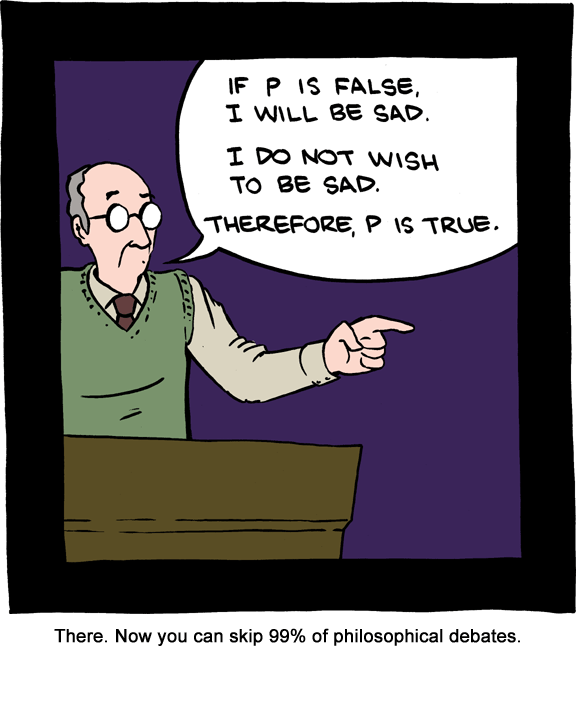In the first case, you know that the blind spot exists and you may work to acquire information about what may be contained within it (e.g., other cars). Or you just dart in and out of lanes haphazardly, denying that any blind spot exists, or at the least denying that you have any reason to check it. Spend a little time on the I-95 corridor in Northern Virginia if you somehow don't know what I mean.
The second case looks much like the first. You can accept that you have intellectual blind spots and work to illuminate the contents therein, thus becoming a more-informed and thoughtful person. Or you just deny that you have any blind spots at all, and dangerously traverse life's highways without ever feeling that you need to improve your view of your surroundings.
The primary differences between these two cases are thus: 1) There are many fewer blind drivers out there than blind thinkers, and 2) The negative consequences of blind driving are much more obvious to people. You might say that for a lot of people, their blind spots are their blind spot.
 |
| Credit: www.xkcd.com |
This review is also terrible. Not terrible in the sense of a great monster rising from the ocean depths to wreak havoc on Tokyo, but terrible in the sense of someone spreading grape jelly on a tuna fish sandwich. Frankly, it is an embarrassment that anyone has ever taken it seriously. MacCorquadale (1970) provided a thorough and devastating analysis of Chomsky's (1959) review, but fewer people know about it. For my part, it always seemed to me that Chomsky was making the following argument: "I do not see how B.F. Skinner could be right about this. I would like to introduce a better idea: I propose magic!"
This post is not about Chomsky and his incoherent bumbling about verbal behavior, though. There will be a time and place for all that. This is about blind spots. |
| Noam Chomsky in his usual Sunday attire. |
Actually, this is about a particular blind spot. Here, I refer to human beings' fervent desire to be something special. People do not simply wish to be a part of the natural world. People want to be more. People want to have choice. They want to have free will. Unlike almost every other known item in the entire universe, they want to be in control of their own destiny. They want to matter in a way that nothing else does. This clouds their judgment, to the point where they cannot possibly accept the alternative: That they are just a piece of the clockwork. And I get it. At least, I think I get it, in the sense that I "get" the appeal of soccer. I do not love soccer, but I think I can appreciate the reasons why some people do. But like the sight of a group of drunk soccer hooligans outside a British pub during the World Cup, I find the collective misunderstanding of our rightful place in the universe to be profoundly alien.
Millions of pages have been written by philosophers and scientists on the nature of free will, of choice, of decision-making, of cognitive control. And I think that those millions of pages have been wasted describing phantoms. I have read no convincing arguments that we have anything approaching anything similar to such freedom. I think that those who would suggest we do need to more carefully examine their premises. Because too often, it smacks of wishful thinking (hat tip to Saturday Morning Breakfast Cereal).
The impetus for this post comes from a recent experience I had when reading a portion of a highly-regarded textbook on artificial intelligence: Artificial Intelligence (3rd ed.) by Stuart Russell and Peter Norvig. The former author is a professor at Berkeley, and the latter is a Director of Research at Google. The text seems thorough and a valuable resource, but I cannot help but be irritated by the following point:
“One problem with a purely physical conception of the mind is that it seems to leave little room for free will: if the mind is governed entirely by physical laws, then it has no more free will than a rock “deciding” to fall toward the center of the earth.” (emphasis added)They do not go on to satisfactorily clarify what exactly the problem is, nor what the "mind" is.
Personally, I do not see the problem. What is the problem with leaving little (or no) room for free will? Physical laws appear to govern everything else in the universe, so why not human behavior? What, other than wishful thinking, allows us to believe that we are somehow fundamentally different from everything else by which we are surrounded? Incidentally, I think they absolutely nail the truth here, even though it was inadvertent. I think it is correct that we have no more free will than a rock falling to the earth.
I would dearly love for someone to demonstrate to me otherwise. But I am rapidly growing convinced that no one has an answer that does not appeal to the supernatural.






